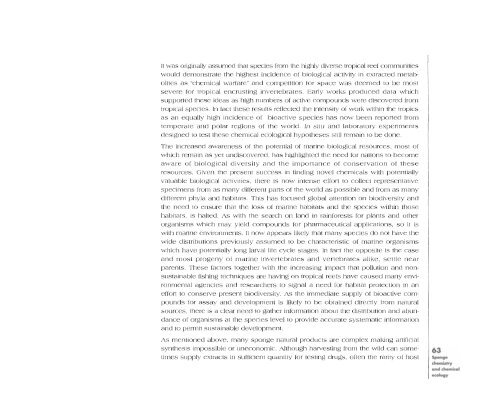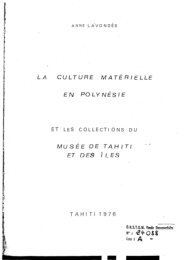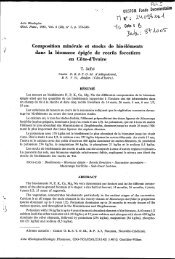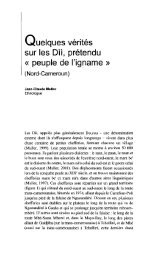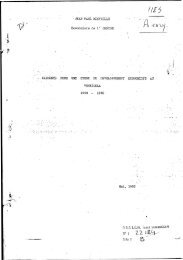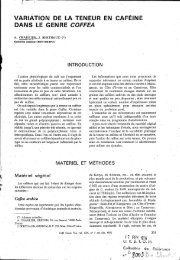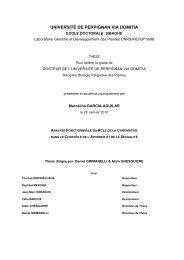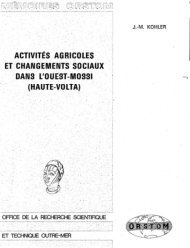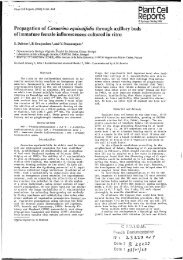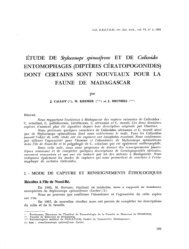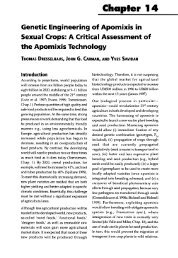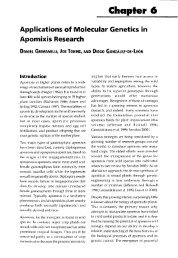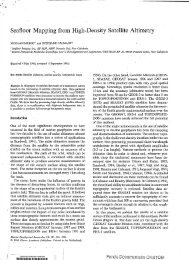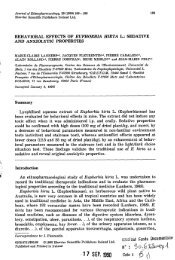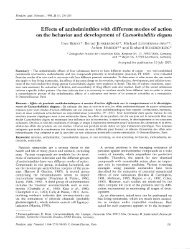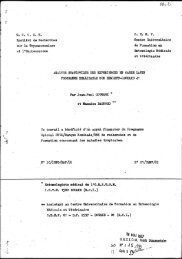Sponges of the New Caledonian lagoon - IRD
Sponges of the New Caledonian lagoon - IRD
Sponges of the New Caledonian lagoon - IRD
You also want an ePaper? Increase the reach of your titles
YUMPU automatically turns print PDFs into web optimized ePapers that Google loves.
It was originally assumed that species from <strong>the</strong> highly diverse tropical reef communities<br />
would demonstrate <strong>the</strong> highest incidence <strong>of</strong> biological activity in extracted metabolites<br />
as "chemical warfare" and competition for space was deemed to be most<br />
severe for tropical encrusting invertebrates. Early works produced data which<br />
supported <strong>the</strong>se ideas as high numbers <strong>of</strong> active compounds were discovered from<br />
tropical species. In fact <strong>the</strong>se results reflected <strong>the</strong> intensity <strong>of</strong> work within <strong>the</strong> tropics<br />
as an equally high incidence <strong>of</strong> bioactive species has now been reported from<br />
temperate and polar regions <strong>of</strong> <strong>the</strong> world. In situ and laboratory experiments<br />
designed to test <strong>the</strong>se chemical ecological hypo<strong>the</strong>ses still remain to be done.<br />
The increased awareness <strong>of</strong> <strong>the</strong> potential <strong>of</strong> marine biological resources, most <strong>of</strong><br />
which remain as yet undiscovered, has highlighted <strong>the</strong> need for nations to become<br />
aware <strong>of</strong> biological diversity and <strong>the</strong> importance <strong>of</strong> conservation <strong>of</strong> <strong>the</strong>se<br />
resources. Given <strong>the</strong> present success in finding novel chemicals with potentially<br />
valuable biological activities, <strong>the</strong>re is now intense effort to collect representative<br />
specimens from as many different parts <strong>of</strong> <strong>the</strong> world as possible and from as many<br />
different phyla and habitats. This has focused global attention on biodiversity and<br />
<strong>the</strong> need to ensure that <strong>the</strong> loss <strong>of</strong> marine habitats and <strong>the</strong> species within those<br />
habitats, is halted. AS with <strong>the</strong> search on land in rainforests for plants and o<strong>the</strong>r<br />
organisms which may yield compounds for pharmaceutical applications, so it is<br />
with marine environments. It now appears likely that many species do not have <strong>the</strong><br />
wide distributions preViously assumed to be characteristic <strong>of</strong> marine organisms<br />
which have potentially long larval life cycle stages. In fact <strong>the</strong> opposite is <strong>the</strong> case<br />
and most progeny <strong>of</strong> marine invertebrates and vertebrates alike, settle near<br />
parents. These factors toge<strong>the</strong>r with <strong>the</strong> increasing impact that pollution and nonsustainable<br />
fishing techniques are having on tropical reefs have caused many environmental<br />
agencies and researchers to signal a need for habitat protection in an<br />
effort to conserve present biodiversity. As <strong>the</strong> immediate supply <strong>of</strong> bioactive compounds<br />
for assay and development is likely to be obtained directly from natural<br />
sources, <strong>the</strong>re is a clear need to ga<strong>the</strong>r information about <strong>the</strong> distribution and abundance<br />
<strong>of</strong> organisms at <strong>the</strong> species level to provide accurate systematic information<br />
and to permit sustainable development.<br />
AS mentioned above, many sponge natural products are complex making artificial<br />
syn<strong>the</strong>sis impossible or uneconomic. Although harvesting from <strong>the</strong> wild can sometimes<br />
supply extracts in sufficient quantity for testing drugs, <strong>of</strong>ten <strong>the</strong> rarity <strong>of</strong> host<br />
63<br />
Sponge<br />
chemistry<br />
and chemical<br />
ecology


